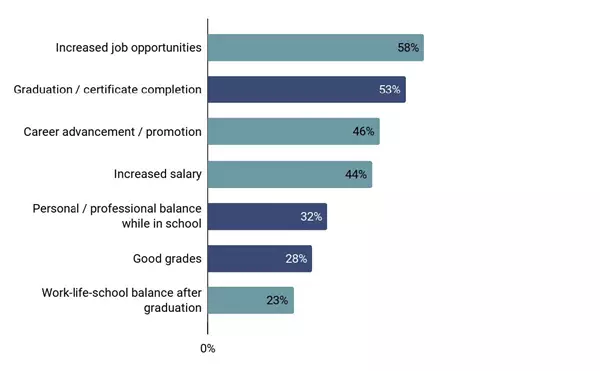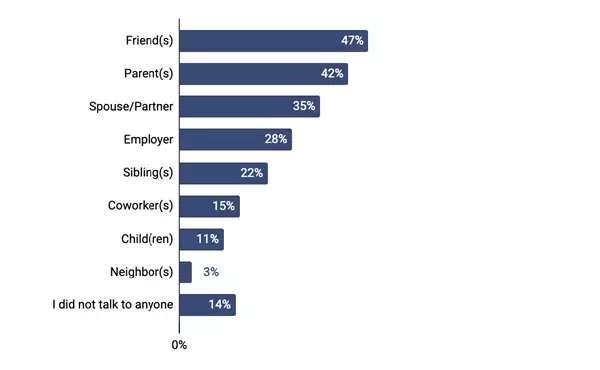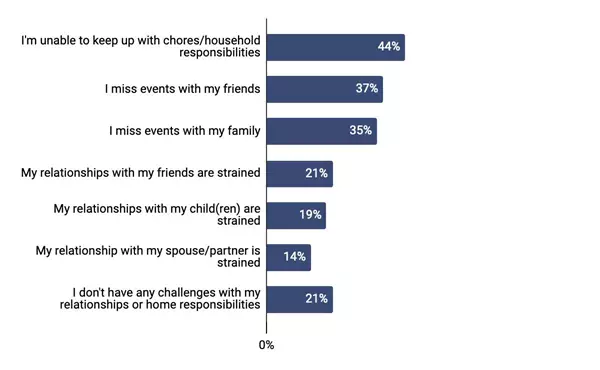How nontraditional students benefit from support systems

Written by Michael Feder

Reviewed by Marc Booker, PhD,  Vice Provost, Strategy

If youβÄôre considering going back to school, youβÄôve likely thought about the financial costs, time commitment and academic requirements. But have you considered what your daily life might look like when youβÄôre enrolled? How, for example, will you balance your coursework with your job, or your household responsibilities with your relationships? How can you prepare both yourself and those around you for the rigors and requirements of going back to school? Read on to find out how establishing a strong support network has spelled success for others βÄî and just might help you too.
How does a nontraditional student define success?
To better understand the landscape facing this population of learners today, ΤΏ…Ϊ ”ΤΒ commissioned a survey of 500 nontraditional students in the U.S. who were enrolled in online or hybrid college programs within the past four years. (In this case, βÄ€nontraditionalβÄù refers to students who did not enroll in college directly after high school.) Of those students, 75% considered themselves successful.
The graph below reveals how success can be defined in a variety of ways, and surveyed students identified the following factors as potential measures of success:  

Increased job opportunities: 58%
Graduation / certificate completion: 53%
Career advancement / promotion: 46%
Increased salary: 44%
Personal / professional balance while in school: 32%
Good grades: 28%
Work-life-school balance after graduation: 23%
Support systems correlate with student success
While everyoneβÄôs path is different, survey results suggest that students who consider themselves successful usually have at least one thing in common: They have a strong support system.
Going to college requires a significant commitment, and itβÄôs important to not wait until youβÄôre feeling overwhelmed to get help. The data bears this out. According to surveyed nontraditional students, those who felt successful were 2.5 times more likely to proactively seek help and support.
How to build a support system
A support system, like oneβÄôs measurement of success, can look different ways. It may consist of close family or friends or it may leverage the mentorship and encouragement of an employer. The following graph shows who surveyed students reached out to when building their support systems.

Friend(s): 47%
Parent(s): 42%
Spouse / Partner: 35%
Employer: 28%
Sibling(s): 22%
Coworker(s): 15%
Child(ren): 11%
Neighbor(s): 3%
I did not talk to anyone: 14%
Why are diverse support systems important? Not only can those in the inner circle of a nontraditional student offer emotional support, but friends, family, colleagues and neighbors can also help pick up the slack when life issues arise. For example, maybe the car wonβÄôt start or your child has a doctor appointment. This is more than conjecture. The chances something will happen during your academic journey are high: Eight in 10 nontraditional students reported they had a personal issue while enrolled.
Sometimes these issues directly affect the people in your support system. After all, dedicating weekends to studying or evenings to completing homework means that time is taken away from something βÄî or someone βÄî else. Half of the survey respondents reported they missed events with friends or family, while 39% reported that at least one of their relationships was strained while they were actively taking classes.
To give you an idea of some of the pressures that can arise, hereβÄôs a closer look at the specific challenges faced by nontraditional students in the survey:¬†

I'm unable to keep up with chores / household responsibilities: 44%
I miss events with my friends: 37%
I miss events with my family: 35%
My relationships with my friends are strained: 21%
My relationships with my child(ren) are strained: 19%
My relationship with my spouse / partner is strained: 14%
I don't have any challenges with my relationships or home responsibilities: 21%
If you find youβÄôre struggling to get the emotional and moral support you need, itβÄôs important to have the difficult conversation with the friend or family member to ask for help βÄî and make a plan to achieve it.
Of course, it can also help to have a conversation ahead of time to set expectations. Let those who depend on you know there will be less time for them while you pursue your education. A conversation like this can also be an opportunity to talk about whatβÄôs essential and what you can live without during the dedicated time you pursue a degree. ¬†
Getting help at home
While emotional support is important, nontraditional students may also need practical help. Daily responsibilities where extra support can make a difference include:
- Child care
- Pet care
- Grocery shopping and meal preparation
- Household chores and maintenance
- Errands
Reach out to your spouse, your partner or a trusted friend or relative ahead of time to discuss how you can share daily workloads.
Getting help at work
In addition to help at home, successful nontraditional students benefit from support in their workplace. Compared to their less successful peers, nontraditional students with workplace support are more likely to have:
- Flexible working hours
- Coverage during scheduled class times
- Support during exams or busy academic periods
- The ability to work from their preferred location
To maximize the potential of receiving workplace support, talk with your manager ahead of time about what youβÄôll need, and be sure to offer ideas on how you can make it work within your employerβÄôs framework.
Find uninterrupted study time
One way to complement a strong support network is to safeguard regular and uninterrupted study time. In fact, surveyed students who felt successful were almost twice as likely to utilize uninterrupted time to study.
While finding uninterrupted time can be challenging, students can employ such strategies as:
- Creating a dedicated study space at home
- Setting firm boundaries around study hours
- Using early mornings or late evenings when others are asleep
- Leveraging lunch breaks or commute time (if using public transportation)
- Scheduling study blocks like any other important appointment 
How UOPX supports the nontraditional student
If youβÄôre planning to return to school as a nontraditional student, consider how you can align your support system, employer and university to build a functional framework.
ΤΏ…Ϊ ”ΤΒ, for example, offers numerous student resources, including financial literacy workshops, math and writing tutoring, new student orientations, life coaching and more to support nontraditional students.
Outside of school, be sure to:
- Have transparent conversations with family, friends and employers about your educational goals and the support youβÄôll need
- Create a realistic schedule that accounts for classes, study time, work and family commitments
- Identify potential challenges in advance and develop contingency plans
Doing all these things can allow you to focus on your studies, enhance your skill set and ultimately grow inside and outside the classroom while managing the challenges faced as a nontraditional student today.

ABOUT THE AUTHOR
A graduate of Johns Hopkins University and its Writing Seminars program and winner of the Stephen A. Dixon Literary Prize, Michael Feder brings an eye for detail and a passion for research to every article he writes. His academic and professional background includes experience in marketing, content development, script writing and SEO. Today, he works as a multimedia specialist at ΤΏ…Ϊ ”ΤΒ where he covers a variety of topics ranging from healthcare to IT.

ABOUT THE REVIEWER
Dr. Marc Booker, ΤΏ…Ϊ ”ΤΒ Vice Provost for Strategy, has more than two decades of experience working with online and distance education students at the post-secondary level. He currently oversees critical path academic initiatives to improve the student experience. Dr. Booker is a regular speaker, author and contributor to national higher education associations.
This article has been vetted by ΤΏ…Ϊ ”ΤΒ's editorial advisory committee.¬†
Read more about our editorial process.


